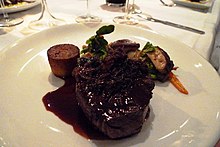Talk:fondant
Fondant as an Adjective
[edit]- Some people keep removing my entry for the use of the word "fondant" as an adjective. In culinary terms the word is used to indicate a soft or melting consistency, as in "fondant potatoes" or "fondant bone marrow". Could you leave it alone please? 220.233.178.130 23:08, 2 January 2009 (UTC)
- That is not an adjective. It is the attributive use of the noun. SemperBlotto 23:10, 2 January 2009 (UTC)
- But this adjectival use of the word introduces a completely separate definition. The definition given needs to include this sense, otherwise the entry will not be of practical use. If you want to re-write the entry, could you include this attributive use? This sense of the word is by no means uncommon in cookbooks and professional kitchens.220.233.178.130 05:06, 3 January 2009 (UTC)

The following information has failed Wiktionary's verification process (permalink).
Failure to be verified means that insufficient eligible citations of this usage have been found, and the entry therefore does not meet Wiktionary inclusion criteria at the present time. We have archived here the disputed information, the verification discussion, and any documentation gathered so far, pending further evidence.
Do not re-add this information to the article without also submitting proof that it meets Wiktionary's criteria for inclusion.
Other dictionaries, including 1913 Webster's, seem to be quite unanimous about the meaning of this word. They say:
- flavored sugar preparation, used for icing cakes or as a filling for chocolates.
- candy made with this preparation
We have the first of these. Instead of the second, we have these:
- Dark chocolate.
- A croquette.

Are these real? --Hekaheka (talk) 22:02, 28 April 2015 (UTC)
- I have added the countable candy sense, a sense related to enamel flux, and a heraldry sense (separate etymology).
- One or two dictionaries have an adjective sense.
- I don't see any dictionary evidence for the two senses you have challenged, but w:fondant refers to w:Molten chocolate cake, aka chocolate fondant, and to fondant potatoes (no article). These might be the basis for the challenged senses. DCDuring TALK 00:52, 30 April 2015 (UTC)
- I have added some images to the entry and found some others that bear on the challenged senses. DCDuring TALK 01:08, 30 April 2015 (UTC)
- Fondant or fondant chocolate does refer to a type of chocolate; e.g.:
- 1916, The International Confectioner, volume 25, page 48:
- Fondant Chocolate— Outside of milk this style of chocolate is without doubt the most largely sold chocolate in Europe and like most of the specialties in the cocoa products is of undoubted Swiss origin.
- 1920 July 27, Frederick George Fryer and Basil Gordon McLellan, patent 1,387,377, for Manufacture of High-Class "Fondant" Chocolate and Similar Chocolates, in the Official Gazette of the United States Patent Office (1921):
- In the manufacture of high class "fondant" chocolate and similar chocolates of the smooth variety, mixing together materials comprising partially ground cocoa liquor and sugar, repeatedly grinding the mixture and subsequently subjecting it to a liquefying operation and then to extreme agitation for a few minutes.
- 1921, Robert Whymper, Cocoa and Chocolate, Their Chemistry and Manufacture, page 320:
- "Fondant" Chocolate. As has already been stated, "fondant" chocolate differs from ordinary plain chocolate only in its " velvety " smoothness, secured by an increased percentage of added cacao butter and by the extremely fine state of division to which each particle of the chocolate mass is reduced.
- It may simply mean "fondue". - -sche (discuss) 19:25, 5 July 2015 (UTC)
- Yes, based on google books:"fondant cheese" and some of the hits for google books:"cheese fondant" (some, however, are using sense 1), I think it does just mean "fondue". I've added that sense and RFV-failed the two RFVed senses. - -sche (discuss) 19:31, 5 July 2015 (UTC)

The following discussion has been moved from Wiktionary:Requests for verification (permalink).
This discussion is no longer live and is left here as an archive. Please do not modify this conversation, but feel free to discuss its conclusions.
RFV of the heraldic term, "Stooping, as for prey: said of an eagle, a falcon, etc." Birds have this attitude in various French coats of arms, but I can only find the term in French (to which language section it needs to be added, especially if the English section fails). I searched together with "montant", with various heraldic colours, and with various bird names. In English I can find the terms descendant and descending used, although not often. (French also has plongeant; if there is any English counterpart of this in blazon I haven't found it; I searched for plongeant, plongant, plungeant, plungant; I couldn't even find plunging used to describe birds in heraldry.) - -sche (discuss) 00:12, 15 May 2023 (UTC)